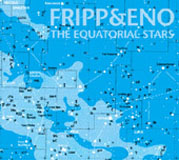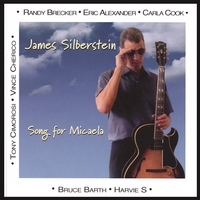Home » Jazz Articles » Album Review » Fripp & Eno: The Equatorial Stars
Fripp & Eno: The Equatorial Stars
In the ensuing thirty years both artists have evolved textural potentials in music. Eno, of course, has been responsible for taking the rhythmically and harmonically static concepts of his early work with Fripp, evolving them into a series of trend-setting recordings called Ambient Music, with the idea that the music could be part of the cultural whole, felt as much as heard. His experiments with sound processing and loops have spawned a whole musical subculture that has often imitated, but never quite copied, his unique musical sound and concept. Fripp, on the other hand, has continued to develop the Frippertronics technique, utilizing guitar synthesis and digital sampling and looping technologies to evolve a more advanced sound process called Soundscapes that is used regularly with King Crimson, but has also resulted in a number of fine recordings dedicated exclusively to the methodology.
With The Equatorial Stars , Fripp and Eno reunite, and the result is unquestionably the finest recording they have made to date. Combining the all-encompassing textures of Eno's Ambient Music with Fripp's more sonically-broad Soundscapes, the two create a recording that may be steeped in technology, but feels somehow independent of it. While there is no way that untreated instruments could sound this way, the whole process feels somehow more organic than its predecessors. Fripp's tone is warmer and more subtle; Eno's processing creates lush and unique timbres. And while, with the exception of the heartbeat-driven "Lupus" and the more insistently pulsing "Altair" there is no real rhythmic or, for that matter harmonic, development, the end result is something that succeeds on two levels. This is music that can be played at a quiet level, supplanting the other ambient sounds around it but in a completely subtle way; or it can be played at a louder volume, creating a hypnotic and wholly involving space that demands attention in a strangely non-intrusive fashion.
Much like Eno's '83 ambient recording, Apollo: Atmospheres and Soundtracks , The Equatorial Stars can be imagined as a soundtrack to imagery that is highly personal. Broader in framework than its predecessors, The Equatorial Stars emerges as the finest addition to Fripp and Eno's collaborative efforts, the result of two completely unhindered and musically uninhibited minds.
Track Listing
Meissa; Lyra; Tarazed; Lupus; Ankaa; Altair; Terebellum
Personnel
Robert Fripp
guitarMusic performed and composed by Brian Eno and Robert Fripp. Produced by Brian Eno.
Album information
Title: The Equatorial Stars | Year Released: 2004 | Record Label: DGM Live
Tags
PREVIOUS / NEXT
Support All About Jazz
 All About Jazz has been a pillar of jazz since 1995, championing it as an art form and, more importantly, supporting the musicians who make it. Our enduring commitment has made "AAJ" one of the most culturally important websites of its kind, read by hundreds of thousands of fans, musicians and industry figures every month.
All About Jazz has been a pillar of jazz since 1995, championing it as an art form and, more importantly, supporting the musicians who make it. Our enduring commitment has made "AAJ" one of the most culturally important websites of its kind, read by hundreds of thousands of fans, musicians and industry figures every month.






















